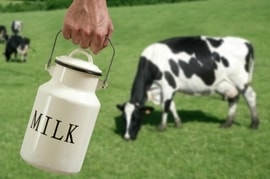
Make sure you get your milk every day?, we are told from childhood. Almost every diet that exists in the country still encourages you to get your milk to keep your bones healthy, first as you grow, then as you age. Most of us head to the supermarket, grab our cartons and head on our way. We consider things like fat content. We might even know a little bit about where our milk comes from. Most of us don?t, though. So, let?s take a look at regular milk versus organic milk and see how we may really be hurting ourselves.
The problems with regular milk include:
The animals are not moving
Animals are grain fed instead of grass fed
Cows may be also injected with bovine somatotropin Posilac ( http://en.wikipedia.org/wiki/Milk http://en.wikipedia.org/wiki/Posilac).
The above is true for 85-95% of cows in the United States that are raised in confinement. Why do they do it? Because this technology makes cows produce three times as much milk as they would in natural conditions. The result is less CLA (conjugated linoleic acid), one of the most important cancer fighters. Milk from a free-range cow has five times as much CLA as regular milk (http://en.wikipedia.org/wiki/Milk ).
Also, CLA is known to help to reduce weight by reducing fat and increasing lean muscle mass. Milk from free-range cows also contains an ideal omega-6 to omega-3 fatty acids ratio, which is 1:1 to 2:1. Because a regular cow produces three times as much milk as a cow in natural conditions, its milk contains at least three times less vitamins and minerals as it is supposed to because of the dilution. Of course natural milk also tastes much better.
Another problem also exists in regular milk: pasteurization. Pasteurization kills bacteria which are necessary to digest milk. Of course I do not suggest that you drink unpasteurized milk, because it may be dangerous for your health. What I’m saying is it is healthier to drink unprocessed milk, provided that the cow is healthy, the milk is not contaminated, the container is clean, and the milk is fresh.
When it comes to grass fed cows organic milk, another benefit is that grass contains much more natural nutrients that we need, as opposed to corn. Put it this way: grass is green, and that provides carotens, vitamin A and vitamin E. It is simple. Take fish oil for example. While it is so very crucial to survival, people who live in rural areas and don?t have access to fish somehow manage to survive. The answer is that they get what they need from regular food and milk.
Here is an interesting reason why we need to watch where we get our milk: We have a natural defense: acid in the stomach. When bacteria gets into our system, it is killed by the acid in our stomach. But this will not happen if bacteria is resistant to acid, or if there is not enough acid in your stomach. When you have a healthy cow that is grass fed, the contents of her stomach are neutral and all the bacteria she has are living in a neutral environment. If she is fed corn her stomach content becomes acidic and the bacteria that live there can survive in the acidic environment.
Therefore when we drink unpasteurized milk from this cow, or if the milk is contaminated with cows feces or we eat greens contaminated by cow’s feces, then you get acid-resistant bacteria, going through your stomach without any problems. Your acidity is also reduced by over-the-counter drugs like Pepcid and Omeprazole, or prescription drugs Prevacid and Nexium.Your natural defense doesn?t work anymore. Do you think that we would have much less food born epidemics if we had more grass fed cows?
Nature created a great defense: acidity, and when we don?t have natural cows, we don?t have our natural defenses anymore! Read more here http://www.foodrevolution.org/grassfedbeef.htm
To be safe, you should stick to organic milk, preferably from grass fed cows. It is a little more expensive and much more perishable, but it is totally worth it to be healthier, and make sure that we continue to treat our bodies right, in the most natural way possible. I do not recommend dairy products including milk, but if you do drink milk, you’d better stick with organic.
Do you drink a lot of milk? What kind of milk you drink? How do you tolerate milk you drink? For more information, call 718-382-9200 and talk to Doctor Kalitenko about the benefits of an organic, natural diet.

